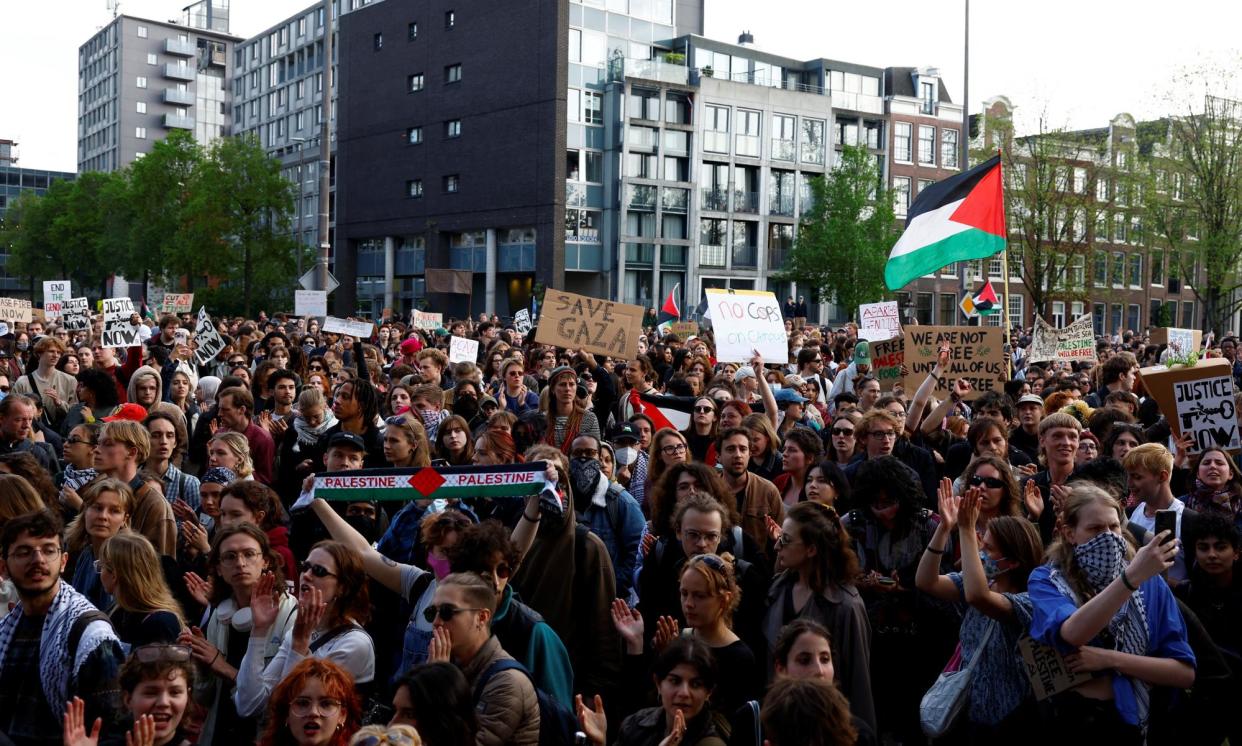Why have student protests against Israel’s war in Gaza gone global?

University campuses around the world have been the stage of a growing number of protests by students demanding academic institutions divest from companies supplying arms to Israel.
The protests, which first spread across college campuses in the US, have reached universities in the UK, the rest of Europe, as well as Lebanon and India.
The students say they are voicing their opposition to, what they describe as, their university’s “complicity” in Israel’s assault on Gaza that has killed more than 34,700 people. Israel said its military offensive was a response to the attack by Hamas militants on 7 October, when about 1,200 people were killed and 250 taken hostage.
More than 2,500 demonstrators have been arrested in the US so far, with protests on college campuses attracting global media attention and reaction from Palestinians trapped in the besieged Gaza.
More protests are expected, with the Israeli assault on Rafah drawing international condemnation. Some students have begun hunger strikes in protest against their university’s “silence and inaction”.
Where are the protests happening?
Demonstrations have been staged at nearly 140 college campuses in the US, spanning 45 states and Washington DC since protests began at Columbia University in New York.
Dramatic scenes unfolded at Columbia about a week ago when more than 100 students were arrested after police officers entered the campus.
The university called on the police to tackle demonstrators who had occupied Hamilton Hall, renaming it Hind’s Hall, after a six-year-old Palestinian girl who was killed in Gaza.
Afterwards, Joe Biden, rejected claims that the protests were non-violent. “Destroying property is not a peaceful protest; it’s against the law,” the US president said.
Biden added: “There is no place for hate speech or violence of any kind, whether it’s antisemitism, Islamophobia, or discrimination against Arab Americans or Palestinian Americans.”
Since then, students at about 14 UK universities have also set up encampments.
Hala Hanina, a Palestinian student who has been involved in protests at the Newcastle University, said: “It’s so important for the student community and British community that they are fighting for justice.”
More than a dozen students at Princetonand 10 students at Edinburgh have said they will begin a hunger strike in protest at their university’s policies.
Prof Peter Mathieson, the principal and vice-chancellor at Edinburgh, said: “We have very recently been notified of the intention of an unknown number of students to commence a hunger strike as an indication of their strength of feeling and determination around issues related to Palestine and Israel.
“While we recognise their bodily autonomy, we appeal to them and others not to take risks with their own health, safety and wellbeing. We are in daily contact with the protesters to ensure they are aware of the health and wellbeing support available to them.”
What is the situation in mainland Europe?
Small protests have taken place at universities including in France, the Netherlands, Germany and Spain, although most were swiftly cleared by police.
The largest was at the University of Amsterdam where riot police, acting at the request of university authorities, city hall and public prosecutors, moved in early on Tuesday morning to break up an encampment that had sprung up on Monday.
Police used a mechanical digger to break down barricades of pallets and bicycles erected by the protesters and used batons to disperse the crowd – 125 of whom refused to leaveand were arrested. Most were released after a few hours.
The university said: “We share the anger and bewilderment over the war, and we understand that there are protests over it. We stress that within the university, dialogue about it is the only answer.”
What are the student protesters calling for?
Many want universities to sell off shares, assets or other investments in companies linked to Israel and its war in Gaza, a move known as divestment.
Activists say universities and colleges investing in Israeli companies or organisations doing business in Israel are “complicit” in the war in Gaza.
The protesters are also calling for a ceasefire, for universities to acknowledge the conflict in the besieged Palestinian territory as a “genocide” and to “condemn the destruction of all of Gaza’s universities”.
Some students have also fused their demands on Gaza with their calls for universities to help tackle the climate crisis.
More than 100 students occupied Ghent University in Belgium calling for concrete action to meet the institution’s 2030 climate plans, as well as demanding it cuts ties with companies connected to the Israeli military.
The university did not respond to a request for comment but its director, Rick Van de Walle, posted a statement saying its ethical policies would not change, adding: “No deviation from the existing human rights policy will be used with regard to one particular country, in this case Israel.”
How have universities responded?
There has been a varied response from academic institutions to student protests, ranging from dramatic crackdowns to negotiations.
Brown University in Rhode Island brokered an agreement with students last week that the institution’s highest governing body, the Corporation, would vote on divestment from companies affiliated with Israel during a meeting in October. In return, students cleared the encampments.
Northwestern University in Illinois and the Evergreen State College in Olympia, Washington, have also reached agreements with students, while Columbia has called off its main graduation ceremony.
An occupation at Goldsmiths in London also came to an end after the university agreed to the students’ demands, including the renaming of a lecture hall after the Al-Jazeera journalist Shireen Abu Akleh, humanitarian scholarships for Palestinian students and a review of the International Holocaust Remembrance Alliance definition of antisemitism.


